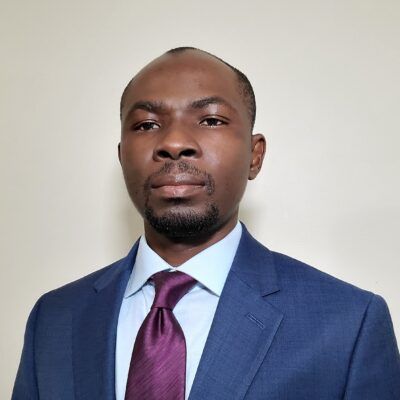For the second year, Cooperation Canada is celebrating Black History Month by highlighting the voices and contributions of Black leaders in Canadian international cooperation. Through this digital campaign, we are profiling changemakers, innovators and disruptors who are shaping the sector, sharing their achievements, challenges and perspectives. By amplifying these stories, we aim to foster greater recognition of Black leadership and inspire meaningful dialogue on equity and inclusion in international cooperation. Join us in recognizing and honouring these incredible leaders throughout February!
This week, we invite you to meet Isaac Bayor, Senior Policy Analyst at Canadian Lutheran World Relief (CLWR).
Why did you decide to work in international cooperation and what have been some career highlights?
The world of international cooperation is complex, but at its core, it’s about people coming together across borders to create meaningful change. As Desmond Tutu once said, “Do your little bit of good where you are; it’s those little bits of good put together that overwhelm the world.” This belief is at the heart of my commitment to the field—knowing that even small acts of kindness can lead to lasting transformation.
A key career highlight was leading the board of the Africa Canada Policy Innovation Lab, a small but impactful nonprofit, to reshape its strategic direction. This experience allowed me to leverage my experience in international cooperation to foster a new narrative—one rooted in mutual respect and innovative partnerships between Africa and Canada. The goal was to shift from a top-down aid model to one of shared growth, leveraging and strengthening the comparative advantages of both regions to address shared pressing global challenges and promote mutual prosperity.
What experiences have influenced your career as a Black person in the international cooperation sector?
Like many immigrants to Canada, I wear multiple hats, and the intersection of my identities as a Black person and an immigrant has profoundly shaped my career. I often find myself bridging different worlds—navigating policy spaces while bringing the perspectives of my community. This dual lens enriches my approach to policy-making but also requires constant reflection on my positionality. It has made me acutely aware of the power dynamics and historical contexts that still influence the international cooperation sector. This awareness drives a critical question I ask myself daily: How can we move beyond the legacy of aid—rooted in hierarchy and dependency—and transform international cooperation into a true partnership for shared growth and prosperity?
What are your hopes for the future, and what advice would you give to those wishing to work in international cooperation?
I envision a future where international cooperation becomes a dynamic space for innovation, where creative partnerships foster mutual prosperity across regions. For those aspiring to enter this field, my advice is to embrace bold thinking, adaptability and an open mind. Our sector is facing a rapidly changing geopolitical landscape and emerging global challenges that demand fresh ideas. The conventional approaches that once served us are no longer enough.


